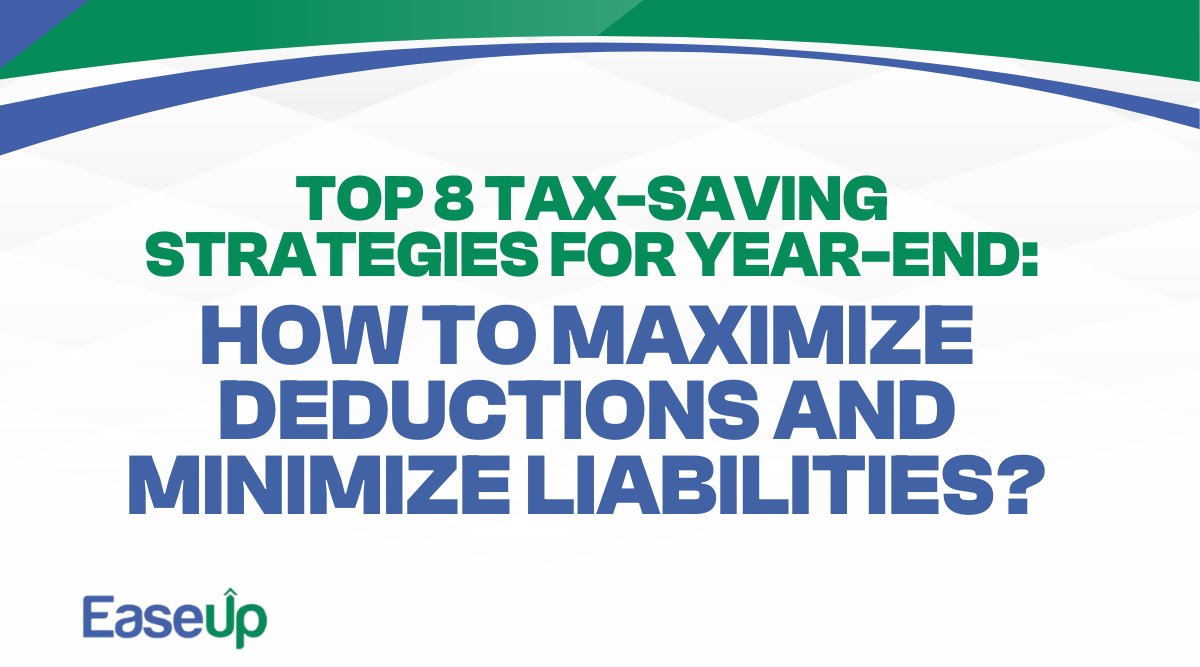

Tax Planning for Startups: Your Comprehensive Guide to Saving More
Sep 26,2023

Starting a business is a thrill ride, full of ups and downs, and taxation often emerges as one of those complicated downs. As the leading Financial Consultant for Startups, Tech Companies, and Small and Medium Businesses in India, EaseUp is here to help you understand startup tax planning. This blog will focus on the essentials of Indian tax laws, key tax planning strategies, and how a well-thought-out tax plan can be a game-changer for your startup.
The Importance of Tax Planning for Startups
In India, tax planning isn’t a once-a-year affair but an ongoing strategy that can save you significant money and time. For startups, intelligent tax planning is critical for managing resources, ensuring cash flow, and paving the way for sustainable growth. If you don’t have a tax plan, you’re leaving money on the table.
Key Tax Planning Strategies for Startups
1. Choosing the Right Business Structure
The tax consequences differ based on your business structure. Your tax liabilities and benefits will vary whether you’re a Private Limited Company, an LLP, or a Sole Proprietorship. For instance, Private Limited Companies offer more significant opportunities for tax planning but come with stricter compliance requirements.
2. Capital Expenditure Planning
Capital expenditure allows you to claim depreciation, a valuable deduction against your taxable income. It’s vital to be compliant with the Companies Act of 2013 when it comes to asset depreciation.
3. Employee Benefits and Compensation
Tax liabilities can also be reduced by restructuring employee benefits and compensation packages, including tax-free allowances such as House Rent Allowance (HRA), meal coupons, and other standard deductions.
4. Utilizing Tax Incentives
Indian startups can leverage numerous tax incentives. For instance, benefits under Section 80-IAC of the Income Tax Act allows recognised Startups to get a 100% tax exemption for 3 consecutive profit making years.
5: Year-end Tax Planning
Review your financial statements to calculate income and expenses. Strategically postponing payment to the next year or advancing payments to the current year can minimize your present year’s tax liability.
Tax Exemption for Startups in India
Startups can Apply for 80 IAC Tax Exemption and Exemption under Section 56 of the Income Tax Act after getting a DPIIT Certificate.
Startup India Registration is the recognition for startups by the DPIIT (Department of Promotion of Industry & Internal Trade). This recognition helps Startups avail themselves of the benefits of the Government’s Flagship Startup India Scheme.
Startup India: 80 IAC Tax exemption
After getting recognition, a Startup may apply for Tax exemption under section 80 IAC of the Income Tax Act. After getting clearance for Tax exemption, the Startup can avail of a tax holiday for three consecutive financial years out of its first ten years since incorporation.
Eligibility Criteria for applying for Income Tax exemption (80IAC):
The entity should be a recognized Startup.
Only a Private limited or a Limited Liability Partnership is eligible for Tax exemption under Section 80IAC
The Startup should have been incorporated after 1 April 2016
Startup India: Tax Exemption under Section 56 of the Income Tax Act
After getting recognition, a Startup may apply for Angel Tax Exemption.
Eligibility Criteria for Tax Exemption under Section 56 of the Income Tax Act:
The entity should be a DPIIT-recognized Startup.
The aggregate amount of paid-up share capital and the Startup’s share premium after the proposed share issue, if any, does not exceed INR 25 Crore.
Common Pitfalls to Avoid in Tax Planning
Poor Record-Keeping: Flawed or inadequate documentation can lead to compliance concerns and hefty fines.
Missing Deadlines: Delays in tax filing and payments can result in penalties and unnecessary scrutiny from tax authorities.
Not Seeking Professional Help: The complexity of Indian tax laws cannot be overstated. Expert guidance can save you from unintentional missteps and maximize your tax savings.
How EaseUp Can Assist Your Startup in Tax Planning
EaseUp offers specialized Taxation and Compliance Services designed specifically for startups in the intricate landscape of Indian tax laws. With over a decade of expertise in this sector, our professionals are well-equipped to guide you in the following ways:
Personalized Tax Strategies: EaseUp considers your startup’s unique nature to formulate a tax plan tailored just for you.
Comprehensive Compliance Management: Our team ensures that your startup fully complies with the latest tax laws and regulations, thus eliminating the risk of costly legal complications.
Financial Advisory Services: Beyond tax planning, EaseUp offers Financial Advisory Services to help you make informed financial decisions aligning with your business goals.
Due Diligence and Business Valuation: Whether you are looking to attract investors or acquire another business, our due diligence and business valuation services provide your startup with an added layer of financial intelligence.
Conclusion
Understanding and implementing tax planning is not a luxury but a necessity for startups in India. By incorporating tax planning into your overall business strategy, you’re not just staying compliant but setting your business up for long-term financial health and success.
To optimize your startup’s tax strategy, contact EaseUp for a free initial consultation on our Tax Advisory Services. We specialize in crafting customized tax plans to give your startup the financial advantage it deserves.

CA Aditya Chokhra
April 18, 2025

Empower Your Business with Expert Financial Consulting
Latest Post
Leave a Reply

Contact us and subscribe to our newsletter to receive expert advice and industry updates.

Copyright © 2025 Easeupnow. All rights reserved.




















